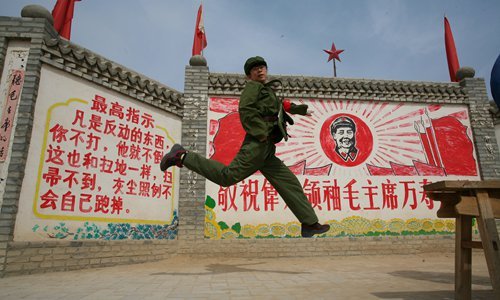
A man in a Red guard costume jumps in front of Cultural Revolution paintings. Photo: CFP
Even though more than four decades has passed, the Cultural Revolution (1966-76) is not forgotten in China and young Chinese students are still learning about this episode of history in classrooms. For decades, Cultural Revolution is never considered "too sensitive to talk about" or should be "avoided," experts said, after some Western media outlets and netizens hyped up a new version of a Chinese history book's illustration of the event, trying to dig up and speculate on any possible "trend" in China's education through any tiny change or detail.
A senior expert, from the compilation group of the current high school history textbook published by the People's Education Press, told the Global Times there is no "avoidance" or "sensitivity" about the topic, either in compiling the textbook or teaching at class. The content about the Cultural Revolution is based on the syllabus of the Ministry of Education and he believed there hasn't been any change about the official decision on the Cultural Revolution.
"About the content on the Cultural Revolution in high school textbooks, we authors follow the decision on historical questions at the Third Plenary Session of the 11th Central Committee of the Communist Party of China," the expert told the Global Times.
In the history textbook for high school freshmen published by the People's Education Press under the Ministry of Education, namely the "Outline of China and World history," the definition of the Cultural Revolution is still exactly from the decision concerning the historical questions about the event at the Third Plenary Session of the 11th Central Committee of the CPC.
"The Cultural Revolution did not in fact constitute a revolution or social progress in any sense, nor could it possibly have done so. It was initiated by a leader laboring under misapprehension and capitalized on by counter-revolutionary cliques, leading to domestic turmoil that brought catastrophe to the Party, the country and the whole people," it read.
A picture from the history book was published online recently which aroused discussion and reports, which focused on the differences from a 2018 middle school history textbook that describes the Cultural Revolution as a part of a "difficult exploration."
The photo of the 2018 history book triggered great attention from some Western media outlets, which charged that China was trying to "whitewash" this piece of history. "Who is reversing the verdict of the Cultural Revolution?" some in the West asked.
"We don't have to wear a magnifying glass to read a high school history textbook word for word," Zhang Hong(pseudonym), a history teacher from Fuzhou, Fujian Province, told the Global Times.
In her eight-year career of teaching history in high school, she would not avoid or skip this part like some Western media speculated, but she would prepare carefully, treating it like any other chapter in the textbook.
According to Zhang, although current historical texts have changed some of the context on portraying the Cultural Revolution, the curriculum standards for teachers have not changed: to understand the mistakes of the Cultural Revolution.
Unified textbook
The current history textbook is the national unified edition published by the People's Education Press under the Ministry of Education in September 2019. Around 2016, it was put forward that textbooks for Chinese, Politics and History should be unified nationally.
History experts in universities and institutes then took the task to compile the book starting in 2017 according to the curriculum standards given by the Ministry of Education. The textbook was made after repeated discussions and reviews. Before being officially adopted, the draft was sent to 140 senior history teachers across the country, and the compiling group received many suggestions.
In the new school year of 2019, the new textbook was first used in six provincial regions, including Beijing and Shanghai. The textbook will be adopted by all regions in the Chinese mainland by 2022.
Previously, there were several different versions of history textbooks. "Some talked more about the Cultural Revolution and some less, but all of them were based on the unified syllabus," the expert who participated in compiling the textbook said, remarking that some netizens and overseas media do not need to be too sensitive or even hype up the differences and changes.
According to him, high school textbooks are not that detailed in general due to the limited class hours. "High school students only need to study the conclusion of the Cultural Revolution… In universities, students who study this period of history will have a thorough and deep learning about it."
"The history of the Cultural Revolution will not be forgotten. We want high school students to know about it," he noted.


